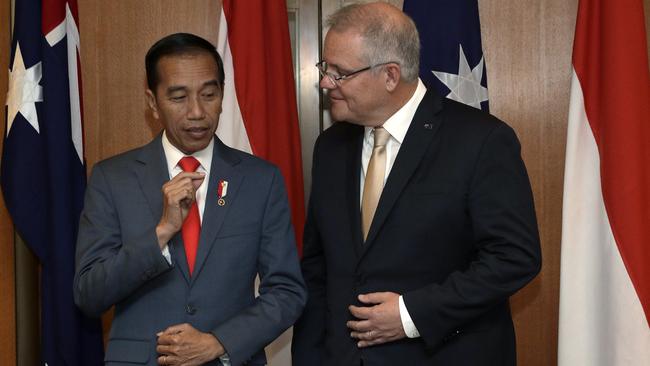Australia to lend Indonesia up to $US1bn
Australia has agreed to lend Indonesia up to $US1bn ($1.37bn) to help stave off an extended financial crisis in Southeast Asia’s biggest economy.

Australia has agreed to lend Indonesia up to $US1bn ($1.37bn) to help stave off an extended financial crisis in Southeast Asia’s biggest economy, amid surging coronavirus cases and the nation’s first recession in 22 years.
The standby loan — which could be drawn on when needed — is being described as a goodwill gesture reflecting the close bilateral ties between the two nations, and the strong personal relationship between Scott Morrison and his Indonesian counterpart, Joko Widodo.
It follows a $1.37bn loan from the Chinese government-backed Asian Infrastructure Investment Bank in June, and a $660m loan from Japan to help the country cope with the pandemic’s economic fallout.
Australia has previously provided emergency finance to Indonesia during the Asian financial crisis of 1997, the global financial crisis that began in 2007, and the 2013 “taper tantrum” panic that swept global markets after the US Federal Reserve announced the windback of post-GFC bond buying.
The loan, which could be offered at a discounted rate of interest, is set to be officially announced in coming weeks.
Indonesia has been hit hard by COVID-19, with more than 433,800 confirmed cases and 14,540 deaths. The official numbers are believed to significantly understate the true extent of the health crisis, amid low rates of testing, overwhelmed health facilities and the inability of the government to impose strict lockdowns due to the need to keep low-income people working.
Indonesia’s economy has been hammered as a result of the pandemic, falling into recession last week after contracting by 3.49 per cent in the September quarter, after a 5.32 per cent slump in the three months to June.
The standby loan is seen as a low- or no-cost means of strengthening the bilateral relationship, amid growing co-operation between Indonesia and China.
Indonesia has agreed to be a testing ground for one of China’s vaccine candidates in return for preferential access to the shots for its population of 270 million.
It will also become a hub for distributing China’s COVID-19 vaccines across Southeast Asia.
The Department of Foreign Affairs and Trade said Australia and Indonesia were working closely together on the COVID response and recovery effort.
“Australia will continue to work in partnership with Indonesia, as well as bilateral donors and international financial institutions, on options for further assistance,” a DFAT spokesman said.
Australia’s aid spending in Indonesia has halved over the past five years, but the country will have access to Australian-funded coronavirus vaccines under a recent $500m regional commitment.
Adam Triggs, from the Australian National University’s Asian Bureau of Economic Research, said Indonesia had about $630bn of debt denominated in foreign currencies. “This poses risks to their economy,’’ Dr Triggs said.
“When the Indonesian exchange rate goes down, such as during COVID when investors pull money out of risky economies, it causes the size of Indonesia’s debt to grow rapidly, which can potentially trigger a currency crisis. When this starts to happen Indonesia may need other countries, or international institutions like the IMF, to provide them with foreign exchange as fast as possible.”
He said Indonesia needed about $14bn to cover its debt repayments in coming years, but “in reality they would not need anywhere near that amount from other countries or international bodies”. “Once they get access to these facilities, they make this known to financial markets.
“It sends a signal to investors that Indonesia has ample liquidity to refinance their debts.”
Dr Triggs said the money should be offered at zero interest or heavily discounted rates “because it is very much in our national interest”.
“If Indonesia was to have significant financial difficulties, that would spill over throughout the region and it would spill back onto Australia through trade and financial links,” he said.
The Reserve Bank also has a bilateral currency swap line with Indonesia’s central bank, allowing Jakarta to swap Indonesian rupiah to Australian dollars for a period of time, to give the markets confidence. Activating that agreement at a time of crisis would require Australian government approval, Dr Triggs said.
Lowy Institute international economy program director Roland Rajah has argued for Australia to lend Indonesia up to about $15bn. He said a $1.4bn loan was “not a huge game changer”, but Indonesia was looking for whatever support it could get.
“They are really concerned about having to pay a lot of interest, and that this will crowd out the space they have got for a long time to spend on their development and infrastructure,” Mr Rajah said.
He said the country was also keen to show investors it was not “on a path to printing money all the time”.
The cost to Australia would be minimal, particularly if the loan was extended at normal interest rates, Mr Rajah said.
“The impact on the underlying cash balance is basically zero, because you’ve got cash coming in and cash coming out at the same rate,” he said.
More Coverage
Read related topics:Coronavirus







